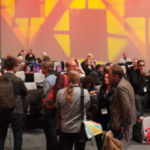While online user-generated content is not a new phenomenon, it’s less common in the world of face-to-face meetings and events. So when Switch, a St. Louis– based experiential marketing agency, was charged with producing the banquet and show opener for the Coca-Cola Scholars Foundation’s “Commit, Celebrate, Connect” weekend in April, creative director Gregg Ellers and his team decided that the best way to create a compelling and memorable visual would be to source the content directly from those people most affected by the organization – past scholarship recipients.
Founded 26 years ago, the Coca-Cola Scholars Foundation has awarded more than $48 million in college scholarships to 5,000 students nationwide. This year, 253 new finalists were introduced to 1,100 other alumni, organization leaders, and special guests – including keynote speaker Morgan Freeman – at the Georgia International Convention Center in Atlanta. The opening video for the banquet featured past recipients describing, in three words, the great things that have happened in their lives as a result of the Scholars program.
Coca-Cola and Switch had invited past scholarship recipients from around the world to upload videos clips of their three words – printed or written onto cards, posters, notepads, or sheets of paper – to a Basecamp.com project (see “Project Home Base,” at bottom of page). Fifty respondents from 15 countries filmed videos with their own camcorders or smartphones, which Switch wove together to background music – without any overlying narrative from the foundation. User-generated content for such programs “really works amazingly well,” Ellers said, “because, these days, everybody’s a video producer, and everybody’s got a camera. We figured out a way to make that accessible for everybody to participate. And it made for a very compelling show.”
Not only is user-generated content at a live event powerful, it can be relatively inexpensive to produce. While it might seem that Coca-Cola would have a large budget for its event-based media applications, the company is actually very frugal with expenditures. “This is a not-for-profit part of Coca-Cola,” Ellers said. “It’s a scholarship fund, so they’re not throwing around huge money, either. I think the difference is, it’s a way for them to get a message out, have people participate in it, and let us build the entire story and the content around that message pretty affordably.”
It’s primarily the under-30 generation – which makes up the majority of Coca-Cola Scholars – that is happy to share personal content with others. And, in Ellers’ opinion, this is where meetings are headed. “The more and more everybody gets accustomed to and comfortable with social media, I think you’re kind of missing the boat if you don’t immerse the people in the program,” Ellers said. “I really think that’s what the future of meetings is going to be – for people to not just feel like they’re hearing a one-way message from the leadership, but to feel like they’re actually part of the conversation.”
Project Home Base
Basecamp is an online, cloud-based project-management system that locates all aspects of a project on one page, allowing multiple users to share, view content, and communicate. Basecamp has created a secure repository for files, images, and even video (as in the case of the Coca-Cola Scholars Foundation’s program) relating to a particular project, all on one convenient page that everyone related to the project can access. Members can discuss aspects of the project with one another via the system or their own email, with everything still housed within Basecamp.
More Resources
Watch “Our Three Words,” Switch’s video for the Coca-Cola Scholars Foundation.



